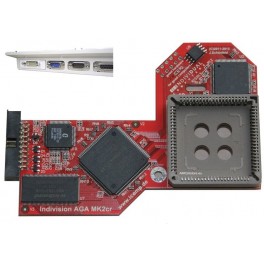Indivision AGA 1200 MK2cr. Includes a DVI trapdoor adapter for the A1200 for free!
Flickerfixer for Amiga 1200 and Amiga 4000T Computers
(*) Installation in A4000T requires removal/replacement of electrolytic capacitor CE164C with a
lower-profile type (available as option on this page)
The new outstanding features are:
- DVI-I Connector
- The Indivision AGA Mk2 is plugged over the Lisa chip, no other connection
- Pixelclock now can output at a maximum of 135MHz
During the 80s, it was common use to build computers in a way that they can output their picture on a TV set. This was done in order to reduce the overall system cost for the user. TV sets work with lower frequencies compared to today's monitors, therefore the picture flickers. A flickerfixer (aka de-interlacer) converts the signal in a way that a modern VGA monitor or TFT-display can be used. The name flickerfixer was mainly created because the problem of a flickering picture is solved. Individual Computers already had a very successful product called Indivision in 2002. It was connected to the monitor output of the computer, but it has been sold out since 2006.
The first flickerfixers for the Amiga have already been available 17 years ago. Since that time, all flickerfixers have been using the same principle: The picture frequency was doubled. This is not enough for most modern VGA monitors and TFT displays, as the picture of a computer with PAL standard was only displayed at slightly less than 50 Hz. Most monitors require 60 Hz or more these days.
Indivision AGA goes a new path. As the name suggests, it's a flickerfixer that is very closely tied to the AGA chipset. This could only be achieved by putting the flickerfixer inside of the computer. The product is mounted over the video chip "Lisa". The VGA display is connected directly to the flickerfixer. Further connections are not necessary.
The outstanding features are:
- 24 Bit colour resolution in all screenmodes
- support for super hires modes
- Highgfx support up to 1024x768 pixels
- all screenmodes can be displayed at 60 Hz or more
- no adjustments necessary
Two options have been added for retro-gaming enthusiasts that allow a step-by-step approximation to the display of an old TV set: Vertical synchronisation allows reducing the output frequency down to 49.9 Hz, which will eliminate tearing effects. In addition to that, a scanline emulation can be switched on. This will simulate the dark lines between the scanlines of a TV screen.
Last configuration tool and current version of the Core software (for expert users) can be download here.

 Amiga 500
Amiga 500
 Amiga 1200
Amiga 1200
 Amiga 600
Amiga 600
 Amiga 4000
Amiga 4000
 Amiga 3000
Amiga 3000
 Amiga 2000
Amiga 2000
 New systems
New systems
 Other systems
Other systems
 Software
Software
 Merchandising
Merchandising









